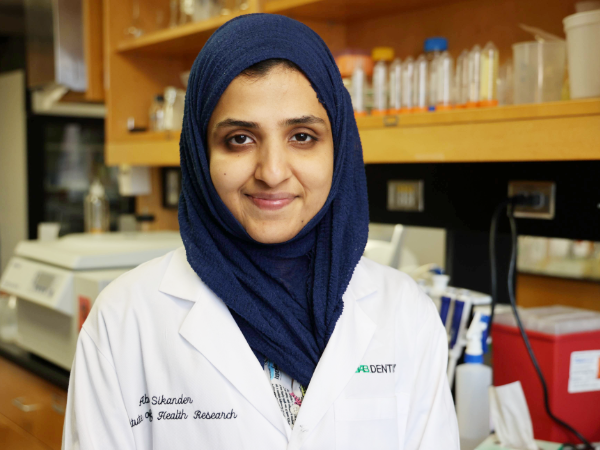Abeera Sikandar’s arrival at the University of Alabama at Birmingham School of Dentistry started off a little bumpy due to international travel delays. Her experience during her time at the SOD couldn’t have been much smoother.
 After receiving a Master’s in healthcare biotechnology from the National University of Science and Technology in her home country of Pakistan, Sikandar was awarded a Fulbright PhD scholarship to attend a university in the United States. She chose UAB on the recommendation of several friends already studying in the U.S.
After receiving a Master’s in healthcare biotechnology from the National University of Science and Technology in her home country of Pakistan, Sikandar was awarded a Fulbright PhD scholarship to attend a university in the United States. She chose UAB on the recommendation of several friends already studying in the U.S.
“They told me that UAB has an excellent graduate school of biomedical sciences, and they’re doing interesting research in many areas, specifically in the field of medicine and dentistry,” Sikandar says. “That’s how I got to know about UAB.”
Sikandar arrived two weeks after the start of her first semester. She already faced the challenge of being in a different country. However, the reaction Sikandar received to her situation from other students and faculty amazed her and propelled her to a successful four years of learning at the SOD that will culminate in graduation this December.
“My experience has been incredible from the first day,” Sikandar says. “I didn’t know anyone here, everything was new for me, and then I missed the first two weeks of classes. But the other students and everyone were so helpful and cooperative that I was able to catch up and pass the courses. It was wonderful.”
Sikandar, who says she has long had an interest in genetics research, especially how changes in levels of specific proteins lead to skeletal disorders, joined Dr. Amjad Javed’s laboratory in the SOD Department of Oral & Maxillofacial Surgery. Javed studies genes involved in the development and healing of cartilage and bone tissues.
“Ubiquitination is the main process by which cells control the level of proteins. While I have been at the SOD, we have discovered two important enzymes, Rbx1 and Rbx2, that degrades proteins in cells essential for producing bone. Blocking these enzymes can potentially enhance bone regeneration and fracture healing.”
Sikandar’s publication on the role of Rbx1 and Rbx2 enzymes in regulating the levels of Sp7 protein has been submitted, and she is working on the second publication regarding the turnover of Runx2 protein.
While Sikandar says she has enjoyed her time in Birmingham, she is eager to return to Pakistan and use her newfound knowledge and skills to help people in her home country through both teaching and continued research.
“I’ve always wanted to learn, then return and give back to my community,” Sikandar says. “I hope to join a university back home and share my experiences and what I’ve learned here. I will contribute more if I go back and help my community that doesn’t have the facilities and technology we have in the U.S.”
“The last few years have changed me a lot. I’ve met a lot of investigators and been able to learn from them. Doing research, presenting at conferences, meeting scientists, and getting involved in world-class research. There has been a lot of personal and professional growth for me in terms of experimental techniques, model systems, and learning new science.”